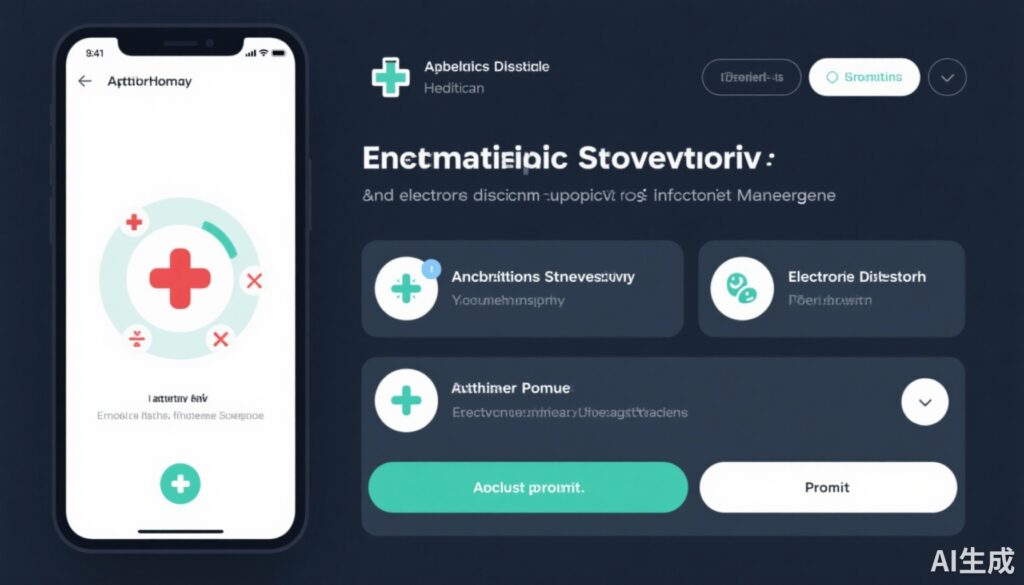Highlights
- Implementation of CPOE prompts presenting individualized MDRO risk estimates reduced empiric extended-spectrum antibiotic days of therapy for hospitalized patients with skin and abdominal infections.
- Antibiotic stewardship bundles incorporating CPOE prompts and education achieved significant relative reductions of 28% (SSTI) and 35% (abdominal infections) in extended-spectrum antibiotic exposure.
- Use of standard-spectrum empiric antibiotics in low-MDRO-risk patients did not increase ICU transfers nor hospital length of stay, supporting safety of narrower antibiotic coverage.
- These pragmatic cluster randomized trials in 92 hospitals provide robust evidence supporting integration of digital health tools to optimize antimicrobial prescribing at hospital admission.
Background
Hospitalized patients with skin and soft tissue infections (SSTIs) and abdominal infections are frequently prescribed empiric extended-spectrum antibiotics targeting multidrug-resistant organisms (MDROs), particularly Pseudomonas spp. and MDR gram-negative bacteria. Despite this approach, actual prevalence of MDROs in these populations remains low, leading to potential overtreatment, increased selective pressure for resistance, adverse drug events, and healthcare costs. Improving empiric antibiotic selection is critical to antimicrobial stewardship efforts aiming to preserve antibiotic efficacy and optimize patient outcomes.
Recent advances in electronic health records and decision support provide opportunities to deliver personalized risk assessments at the point of antibiotic ordering. The INSPIRE 3 and 4 cluster randomized clinical trials evaluated an antibiotic stewardship bundle combining computerized provider order entry (CPOE) prompts presenting patient- and pathogen-specific MDRO risk estimates with targeted feedback and education to reduce unnecessary extended-spectrum antibiotic exposure in noncritically ill hospitalized adults with SSTI and abdominal infection, respectively.
Key Content
INSPIRE 3: Skin and Soft Tissue Infection (SSTI)
This large pragmatic trial included 118,562 adult patients hospitalized with SSTI in 92 hospitals from 2019 to 2023. Patients were non-ICU adults empirically treated for SSTI. The intervention arm received antibiotic stewardship bundles featuring CPOE prompts recommending standard-spectrum antibiotics if estimated MDRO SSTI risk was below 10%, alongside clinician education and feedback.
Results showed a significant reduction in empiric extended-spectrum antibiotic days of therapy per 1000 empiric days from 496.2 to 359.1 in the CPOE bundle group (rate ratio 0.72, 95% CI 0.67-0.79; P<.001), compared with a smaller reduction in routine stewardship. Receipt of any empiric extended-spectrum antibiotics dropped from 55.4% to 43.0% in the CPOE group, versus minimal change in routine care. Crucially, hospital length of stay and days to ICU transfer were statistically noninferior between groups, with no increase in adverse safety events.
INSPIRE 4: Abdominal Infection
This cluster randomized trial enrolled 198,480 patients with abdominal infections across the same 92 hospitals using a similar design and timeline. The intervention similarly utilized CPOE prompts and education recommending standard-spectrum empiric antibiotics when absolute MDRO risk was less than 10%.
Empiric extended-spectrum antibiotic days of therapy were reduced by 35% (rate ratio 0.65; 95% CI 0.60-0.71; P<.001) in the CPOE group compared to routine stewardship. Receipt of any extended-spectrum antibiotics decreased substantially (47.8% to 37.6%) with the CPOE prompts, compared with stable or increased use in routine care. Safety outcomes including length of stay and ICU transfer showed no clinically meaningful differences, affirming the noninferiority of this narrower empiric strategy.
Methodological and Clinical Implications
Both trials employed cluster randomization across diverse hospital settings, enhancing generalizability. The interventions leveraged clinical informatics integrating individualized MDRO risk prediction models based on patient and pathogen data, facilitating tailored empiric antibiotic choice during the critical first 3 hospital days.
The findings highlight the feasibility and impact of embedding antibiotic stewardship into electronic ordering workflows, enabling reduction of broad-spectrum antibiotic exposure without compromising safety. This addresses critical issues of antimicrobial resistance and antibiotic-related toxicity in common infections.
Expert Commentary
These seminal INSPIRE trials provide compelling evidence that empiric antibiotic selection for hospitalized patients with common infections such as SSTI and abdominal infection can be optimized through data-driven decision support. Routine prescription of extended-spectrum antibiotics in low-MDRO-risk patients is an avoidable contributor to antimicrobial overuse and resistance propagation.
The trials’ strength lies in large sample sizes, multi-institutional design, validated MDRO risk estimation, and clinically meaningful endpoints with rigorous safety monitoring. The consistent reduction in extended-spectrum antibiotic use, without adverse impact on ICU transfers or length of stay, supports implementation in broader clinical practice.
Mechanistically, reducing unnecessary broad-spectrum coverage lessens antibiotic pressure on healthcare microbiomes, potentially decreasing emergence of resistance. The educational and feedback components reinforce behavioral change in prescribing practices.
From a stewardship perspective, tailored empiric therapy guided by risk assessment aligns with antimicrobial stewardship principles advocated by professional societies and guidelines, emphasizing precision medicine approaches. The integration of CPOE prompts within electronic health records represents an effective platform to operationalize such strategy.
Limitations include that the trials did not evaluate microbiological cure or long-term outcomes such as resistance emergence at institutional levels. Also, applicability to critically ill or immunocompromised patients requires further study. Variability in local microbiology and resistance patterns may necessitate adaptation of risk algorithms.
Conclusion
The INSPIRE 3 and 4 cluster randomized clinical trials demonstrate that antibiotic stewardship bundles incorporating computerized provider order entry prompts with patient- and pathogen-specific MDRO risk estimates, together with clinician education and feedback, effectively reduce empiric extended-spectrum antibiotic use in hospitalized patients with skin and abdominal infections. This intervention safely shifts empiric therapy toward standard-spectrum antibiotics in low-MDRO-risk patients without increasing ICU admission rates or hospital length of stay.
These findings support widespread implementation of electronic stewardship tools to improve empiric antibiotic selection, preserving antimicrobial efficacy and mitigating resistance development. Future research should explore broader infection types, refinement of risk prediction models, and long-term microbiological impacts to further advance personalized antibiotic stewardship in clinical care.
References
- Gohil SK, Septimus E, Kleinman K, et al. Improving Empiric Antibiotic Selection for Patients Hospitalized With Skin and Soft Tissue Infection: The INSPIRE 3 Skin and Soft Tissue Randomized Clinical Trial. JAMA Intern Med. 2025 Jun 1;185(6):680-691. doi:10.1001/jamainternmed.2025.0887. PMID: 40208610; PMCID: PMC11986828.
- Gohil SK, Septimus E, Kleinman K, et al. Improving Empiric Antibiotic Selection for Patients Hospitalized With Abdominal Infection: The INSPIRE 4 Cluster Randomized Clinical Trial. JAMA Surg. 2025 Jul 1;160(7):733-743. doi:10.1001/jamasurg.2025.1108. PMID: 40208583; PMCID: PMC11986832.
- Gohil SK, Septimus E, Kleinman K, et al. Initial Antibiotic Selection Strategy and Subsequent Antibiotic Use—Insights From the INSPIRE Trials. JAMA. 2025 Sep 23;334(12):1107-1109. doi:10.1001/jama.2025.11256. PMID: 40674074; PMCID: PMC12272352.



